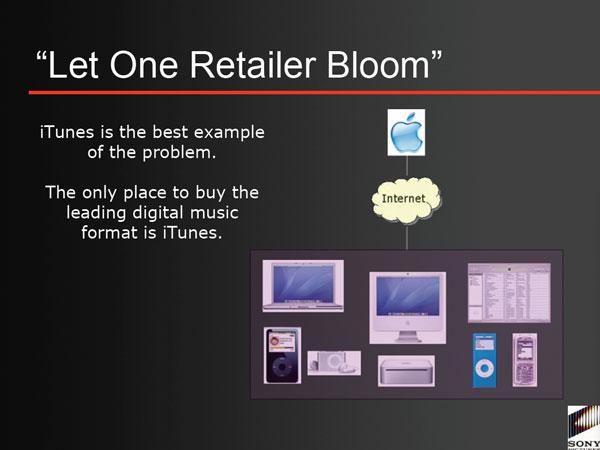Afraid that Apple will gain the sort of lock on downloadable video that it did with music, Sony and a group of video business heavyweights are planning a new standard that would let copy protected movies and TV from any participating service work with many devices..
Officially, the goal is to create an interoperable but still locked down approach to distributing videos online where buyers or renters could simply assume that an online video could work. As long as a device is in the user's "domain," content would play. In a presentation on DECE obtained by AppleInsider, Sony also claims that such a system would create a much more consistent rights environment: customers wouldn't face shifting copy limits if they choose to switch stores, while many stores today are ultimately balkanized.
On Monday, the studio also noted that DECE rules would be looser than they are with many video services today. A shopper would have the option to make unlimited copies, including the DVD burns that have regularly been off-limits at current online providers. In the strictest conditions, a user could still have access to a "locker" which recalls the customer's rights to play certain videos and stream content without any permanent copy involved.
But while this public objective is meant to remove some of the isolation between stores, Sony's presentation also underscores an attempt to head off Apple at the pass. The movie giant cites iTunes' prominence as a music store as an example of "the problem:" by allowing proprietary stores to exist, the music industry has effectively left the dominant format in Apple's control. The latter's decision to move quickly on downloads essentially cornered the market by making it first past the post, Sony says.
Adopting DECE as a standard would prevent this from happening to video by divorcing control from the individual stores and making the rights the service offered to the end user.
The consortium plans to unveil its more detailed strategy for DECE during the Consumer Electronics Show in January, though the described approach bears some similarity to Microsoft's PlaysForSure standard. On its invention in 2004, the Windows Media-driven approach was envisioned as guaranteeing that content from supporting stores would always play on approved computers and devices; that standard continues to struggle for acceptance as its heavy dependence on Microsoft-made software has left it out of the current market, where Microsoft is only a minority.
Both Sony's outline and outside speculation also suggest the movie production house is worried that it might have to remove DRM its videos, which it sees as a negative that would make sharing too easy, remove obligations and prevent companies from invoking the Digital Millennium Copyright Act to enforce usage rights.
 Aidan Malley
Aidan Malley







-m.jpg)






 Wesley Hilliard
Wesley Hilliard
 Stephen Silver
Stephen Silver
 William Gallagher
William Gallagher
 Charles Martin
Charles Martin
 Marko Zivkovic
Marko Zivkovic
 Andrew Orr
Andrew Orr
 Amber Neely
Amber Neely










85 Comments
Interesting how there was not a single iPod in the second example image -- do they intend to keep their content away from 80% of MP3 players?
I think they've missed the mark there, I'd say it was Apple's iTunes software (and it's integration with the hardware) that makes Apple successful, not the ability to have choice over the vendor.
Interesting how there was not a single iPod in the second example image -- do they intend to keep their content away from 80% of MP3 players?
You assume that they excluded Apple. It is much more likely that Apple refused to participate. Doing so would help Apple's competitors reduce iTunes' strength in the music industry.
I really hope that this standardized DRM (calling it 'open' is just helps spread the false idea that it is in any way comparable to DRM free files) does not slow down the adoption of DRM-free media distribution. I think it probably will though, which is a shame.
I really don't see what these companies are going to accomplish by standardizing DRM. Unless they prevent a single DRM-free copy of these files from getting on the internet, they are not going to hamper piracy with DRM. Apple's DRM made sense because it locked people into iTunes/iPod, but standardized DRM? Maybe the intention is just to lock people *out of* iTunes/iPod.
I believe something like this will be integral to the downfall of physical media, although I doubt this gang will get it right on the first try. For a system like this to succeed, there would need to be a third party who acts as the keyholder to your media; this keyholder simply keeps a log of all the media you've purchased, from any of the participating digital stores. Having a license for a particular song, tv show, or movie would grant you access to download that media on any of your devices in it's preferred format and DRM encryption; for example, if you bought a movie on your Apple TV, you would have instant access to download the same movie from the Microsoft store for your Zune (presuming both were participants in the keyholder program).
All the user needs is a username and password for their keyholder account, and would log in exactly as you do on the iTunes Music Store, only your account information would be the same for all digital stores. With this system, the media itself is still tied to each individual device in whatever proprietary format and DRM the device creator chooses, but the user has unlimited usage of the media in that it's not tied to any single device. A licensing system can work if all the major players recognize the license.
Server stored content is not palatable because people don't trust that their content providers will remain in business. This model is doomed before they even begin.